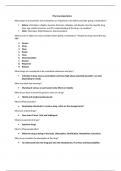Pharmacology Basics
What types of assessments and evaluations are important to do before and after giving a medication?
Before: Vital Signs, 5 Rights, Head-to-Toe Exam, Allergies, Lab Results, Med Hx, Specific drug
data, age-related concerns, and Pt’s understanding of the drug, can swallow?
After: Vital Signs, Right Response, Documentation.
What are the 9 rights you must consider before giving a medication? “People do drugs round the day,
RRR”
1. Person
2. Drug
3. Dose
4. Route
5. Time
6. Documentation
7. Reason
8. Response
9. Refusal
What drugs are considered to be controlled substances and why?
Schedule 2 drug: need a prescription and have high abuse potential (possibly 1 as well,
depending on meds)
What are black box warnings?
Warning of serious or permanent side effects or fatality
Why do you have to know the generic name of a drug?
NCLEX and medical professionals
What is Pharmaceutics?
Developing chemicals to create a drug, what are the dosage forms?
What are enteral drugs?
Goes into GI tract, Oral and Sublingual
What are parenteral drugs?
Injection drugs
What is Pharmacokinetics?
What the drug is doing in the body. (Absorption, Distribution, Metabolism, Excretion)
Why do we consider the absorption of the drug?
To understand how the drug gets into the bloodstream, First Pass and Bioavailability
, What factors affect the absorption of a drug?
The Route (IV, Oral), Drug to Drug Interaction
What is the First Pass phenomenon?
Medication undergoes metabolism at a specific location (Liver)
Which route of administration will be absorbed fastest and slowest?
Fastest: IV
Slowest: Topical
Why do we consider the distribution of the drug?
Getting the absorbed drug to the site of action must leave blood vessels to go into tissues
What factors affect the distribution of a drug?
Drug- to- Drug Interaction, Blood Flow: Drugs bound to proteins are too big to get out of blood
vessels.
What is a drug-to-drug interaction, and why does this occur?
Taking more than one medication together, some drugs are antagonists to each other
What is the importance of drug metabolism?
Biochemical alteration of the drug (makes it inactive and turns active or vice versa),
detoxification, drug resistance intolerance.
What are the cytochrome P-450 enzymes, and why are they so important to medication administration?
They help the drug bind to enzymes to start distribution (happens in the metabolism stage)
What organ is responsible for most drug metabolism?
The Liver
What labs do we monitor to ensure the organ is not damaged from metabolizing the drugs?
ALP, ALT, AST
What factors affect the metabolism of drugs?
Genetics, Age, Diseases, Drug to Drug Interactions, Environmental Factors (Smoking)
What organ is most frequently responsible for the excretion of drugs?
The Kidneys
What labs do we monitor to ensure the organ is not damaged excreting the drugs?
BUN, Creatinine, GFR (glomerular filtration rate)
What is the onset of action of a drug?




